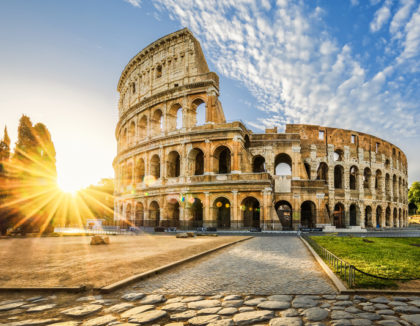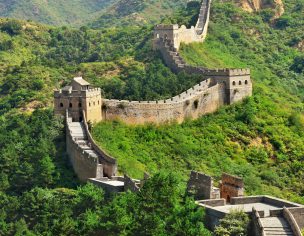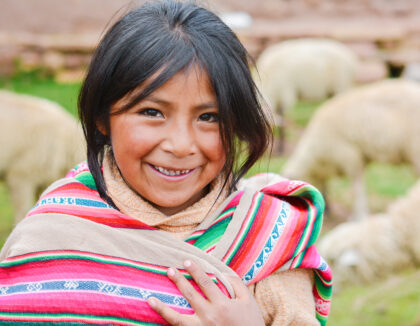National Information on People’s Republic of China
Comparison of temperatures
| Jan | Feb | Mar | Apr | May | Jun | Jul | Aug | Sep | Oct | Nov | Dec |
| Peking | 22 | 23 | 23 | 22 | 18 | 13 | 12 | 13 | 14 | 18 | 20 | 22 |
| London | 6 | 8 | 9 | 11 | 15 | 20 | 21 | 20 | 19 | 15 | 10 | 7 |
General note:
Below is an information overview. The conditions of entry, as well as the political and health situation, can change anywhere in the world at any time. We therefore recommend checking before your trip. Please check the website of the Foreign Office (www.gov.uk) before your departure.
Location:
The People‘s Republic of China is the fourth largest country in the world and covers large parts of Central and East Asia. China borders 14 countries, including Vietnam, Myanmar, Nepal, India and Russia.
Form of government:
People‘s Republic
Capital:
Beijing (Peking), metropolitan area: population ca. 21.5 million.
Religion:
folk religion, Buddhism, Protestant Christianity Christianity, Islam, the Catholic Church and Daoism
Language:
Standard Mandarin, various dialects of Chinese; various minority languages (Mongolian, Tibetan, Uygur, Turkic languages, Korean).
Climate:
Due to the size of the country, there are different climate zones. The north is characterised by a continental climate and the south is subtropical.
Electricity:
220-250 V alternating current, 50 Hz. An adapter is necessary.
Local time:
Despite the very large surface area of China there is only one time zone (Beijing Standard Time). The time difference with the UK is +7 hours in summer and +8 hours in winter.
Making telephone calls:
The dialling code for long-distance calls from the UK to China is 0086, and from China to the UK the dialling code is 0044. The zero is omitted when making local calls.
Country and people:
China has one of the world’s oldest civilisations and, with 1.36 billion inhabitants, has the largest population in the world. When greeting a person, Chinese nod politely or make a small bow. Apart from the large crowds of people in which physical contact is unavoidable, Chinese do not touch anyone whom they do not know. A smile is always preferred to a pat on the shoulder or a similar gesture. It is particularly important to observe these rules when dealing with older people or those in important positions. Numbers and symbols play an important role in China. The number four should be avoided if possible, as it symbolises death.
Food and drink:
The main products are potatoes, tofu, crushed maize flour, rice and other types of cereals. Noodles are also widespread. Dishes with beef, pork and chicken or fish are popular but also very expensive. The specialities vary from region to region, from the typical Beijing duck to hot and spicy dishes in the province of Sichuan Sheng. Chopsticks are the standard eating utensils. Food is placed in the middle of the table and can comprise more than one main dish. This is usually accompanied by rice. After the meal one does not place the chopsticks in the rice bowl but instead clean on the table.
Entry requirements for British citizens:
British citizens require a visa to visit mainland China and thus for this cultural tour (although not for Hong Kong or Macao). This visa can be applied for at the China Visa Application Service Center (CVASC).
At the time you apply for the visa, your passport must be valid for at least another 6 months and must have at least two blank visa pages.
For further information and application, go to the CVASC website at: www.visaforchina.org. Under “Please choose your location”, select “United Kingdom” and then select “London”, “Manchester” or “Edinburgh”.
Citizens of other countries are advised to ask the Chinese embassy about the entry requirements applying to them. For more information on travelling to China, please visit: www.gov.uk/foreign-travel-advice/china/entry-requirements.
Whilst we endeavour to provide guidance where necessary, we can not be responsible for any problems encountered (whether at any point of entry or elsewhere) in the event that passport and visa requirements are not satisfied.
Tour guides:
Your expert tour guides will be able to provide you with detailed information about the country, people, history, culture, etc., and offer advice and assistance for organising your trip. They can also help with room allocation and look forward to welcoming you with initial information. We have put together a varied programme including numerous highlights, enabling you to experience the culture and diversity of landscape that China has to offer, and learn all about the country and its people.
Additional package:
Although your trip already includes a comprehensive package, you also have the option of choosing added extras on arrival.
Gourmet package:The package includes 7x Chinese dinner at the hotel (day 2, 3, 4, 9, 10, 11, 12) and 1x Peking duck dinner on day 13: only £209* per person
Explorer package:The package includes a visit to the water village of Zhujiajiao, the full-day excursion “Terracotta Army, Great Wild Goose Pagoda & the Great Mosque in Xi‘an” and the full-day excursion “Great Wall of China & Ming Tombs with the “Sacred Way” in Beijing”: only £199* per person.
* Package prices may vary when booking on site.
Currency/Banks/Credit cards:
The official currency in China is the renminbi (“people’s currency”). It is also known as the yuan (CNY). 1 CNY = 10 jiao. Exchange rate (as at February 2024): 1 GBP = 9.08 CNY, 1 CNY = 0.11 GBP.
Cash can be withdrawn from ATMs with all major credit cards, but only in larger cities. British bank cards can only be used to a very limited extent at ATMs. In many places, international credit cards are not accepted. As a precaution, always have cash on hand, as foreign tourists are generally unable to pay electronically via the relevant social services.
Customs regulations:
The import of foreign currency is possible for foreigners without restriction, but must be declared on entry if the value exceeds USD 5,000. If the value exceeds USD 5,000, exports are limited to the amount declared on entry. Local currency may be imported and exported up to 20,000 RMB. 400 cigarettes and two bottles of spirits (750 ml each) may be imported duty-free. The export of antiques is subject to strict regulations, subdivided according to the type and significance of the artefacts. For example, coins from before 1949 may no longer be exported at all, and most antiques may only be exported if they bear the red seal of the Chinese Cultural Bureau.
Further customs information on importing goods can be obtained from the embassy of your destination country. Only there can you be given legally binding information.
Important: If you’re travelling to Great Britain from outside the UK, your personal allowances mean you can bring in a certain amount of goods without paying tax or duty. If you go over your allowances you must declare all your goods and pay tax and duty on all the goods in that category. Please inform yourself about the current customs regulations: www.gov.uk/bringinggoods-into-uk-personal-use/arriving-in-Great-Britain.
Special criminal law provisions:
The import or possession of even small quantities of drugs of any kind, including so-called designer drugs such as khat, can lead to severe prison sentences or even the death penalty. Death sentences imposed on foreigners are also regularly carried out in China. The use of VPN services to circumvent state internet censorship in China has been prohibited since the new cybersecurity law came into force in 2017. Commercial VPN providers, including non-Chinese VPN providers, have not yet been permanently blocked for circumventing censorship.
Even though there have been no known cases of foreigners being prosecuted for using VPN services, there is still a potential risk of prosecution at any time, including temporary detention. Photographing military objects, for example, is prohibited. Permission should first be sought when photographing people.
Medical information:
At least 8 weeks before your trip, check the latest country-specific health advice from the National Travel Health Network and Centre (NaTHNaC) on the TravelHealthPro website (https://travelhealthpro.org.uk/countries). Each country-specific page has information on vaccine recommendations, any current health risks or outbreaks, and factsheets with information on staying healthy abroad.
Diarrhoeal diseases:
Most diarrhoeal diseases can be avoided by appropriate food and drinking water hygiene. Here are a few basic rules: Only drink water from a safe source, e.g. bottled water, never water from a tap. In emergencies use filtered, disinfected or boiled water. Also use safe drinking water when cleaning your teeth at any time. With regard to food, cook it or peel it yourself. Be careful to keep flies off your food and drink. Wash your hands with soap as often as possible, always after visiting the toilet and always before preparing food and before eating. Regularly disinfect your hands and use disposable hand towels.
Infectious diseases: To prevent infectious diseases such as Japanese encephalitis (JE), malaria and dengue fever, it is particularly important to protect yourself carefully against mosquitoes. Adhere to the following recommendations:
– Wear long, light-coloured clothing that is impregnated against insects when outdoors
– Consistently rub a suitable repellent into all skin areas
– Use impregnated mosquito nets at night or stay in mosquito-protected rooms (fly screens, air conditioning)
Medical care:
There is no system of practice-based physicians in China. As a result, medical care is concentrated in hospitals. Very large clinical centres with highly modern facilities can be found in cities, but in rural areas the available medical care may still be very rudimentary. Hygiene does not always meet European standards. The main problem in medical care for foreigners is the language barrier and the different medical culture. Due to a lack of English-speaking medical staff, communication without Chinese language skills can be very difficult.
An international health insurance with the option of repatriation to the UK is strongly recommended.
The customer must establish for himself that his physical and mental state is compatible with the selected journey. He is obliged to obtain information about the degrees of physical mobility and mental autonomy required for this journey.
All information is subject to change/Last updated: February 2024
back Information & tips
 Travel highlights
Travel highlights
 Europe
Europe
 Asia
Asia
 America
America
 Africa
Africa
